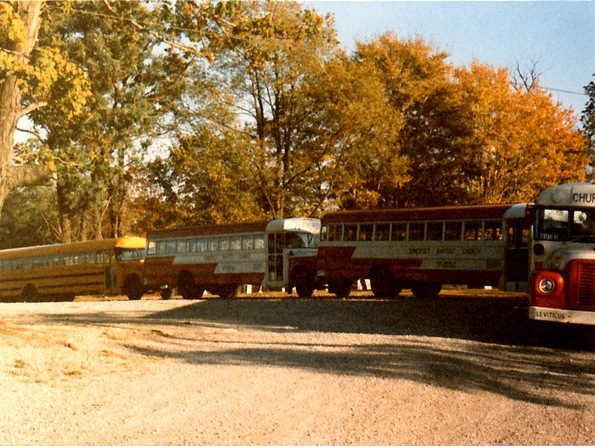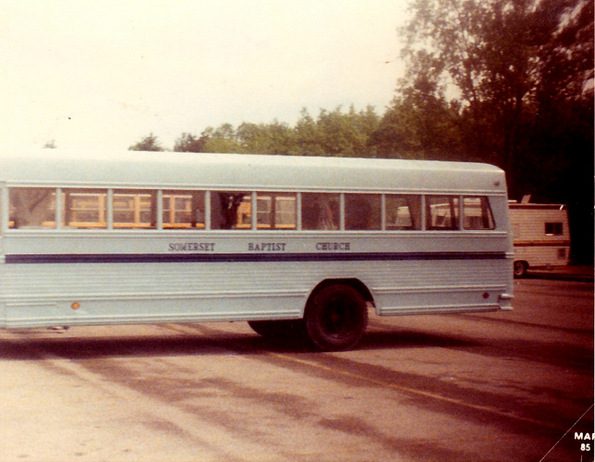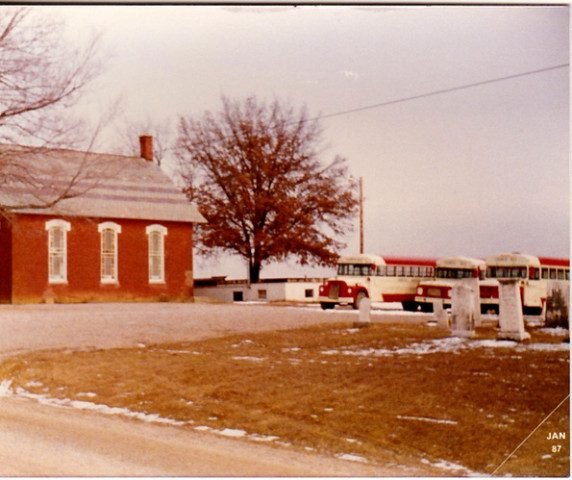
In July of 1983, I planted a new Independent Fundamentalist Baptist (IFB) church, Somerset Baptist Church, in the southeast Ohio community of Somerset. For a few months, services were held at what was commonly called the old shoe store. The church then moved to the second story of the Landmark building where it would remain until it bought an abandoned Methodist church five miles east of Somerset in 1985.
Having spent most of my life around churches that operated bus ministries, I determined that the Somerset Baptist Church would have a bus ministry. In late 1983, the church bought an old, dilapidated bus from Faith Memorial Church in nearby Lancaster (pastored, at the time, by John Maxwell). By mid-1987, the church would own four buses, running routes throughout Perry County and to nearby Lancaster and Zanesville. Attendance would peak at 200, making Somerset Baptist Church the largest non-Catholic church in Perry County, a distinction I proudly advertised. I also advertised the church as the fastest-growing church in the county, an accurate portrayal of the explosive attendance growth the church had for several years.

I was committed to using every available means to reach people with the gospel. I took the Apostle Paul’s approach: I became all things to all men that I might by all means save some.
Luke 14:23 says:
And the lord said unto the servant, Go out into the highways and hedges, and compel them to come in, that my house may be filled.
This verse (and others) was the impetus for the church having an aggressive bus ministry. Every Saturday, bus workers would fan out over the bus operation area, visiting regular riders and canvassing for new ones. Each bus had a captain who was in charge of the route, along with a driver and several workers. It was the captains’ responsibility to make sure EVERYONE on their bus route was visited EVERY Saturday.
Prior to going out on bus visitation, bus workers met with me at the church for a time of prayer and motivation. Running a bus route was hard, thankless work, and keeping people engaged in the work God had called us to do required me to constantly motivate bus workers, often massaging their egos lest they quit.
As in the capitalistic business world where gaining new customers is always part and parcel of growing a thriving business, a successful bus ministry had to continue to find new riders. Using the Apostle Paul’s “all things to all men” methodology, I planned weekly or monthly promotions that bus workers used to entice regular riders to invite their friends, family, and neighbors to church. I also planned promotions for bus workers, rewarding the bus crew that brought in the most riders and visitors.

One Easter, I decided we would give away a five-pound solid chocolate rabbit to the person who brought the most visitors to church (on one of the buses). One of the ladies of the church was a candy maker, so she made the chocolate rabbit. A few days before the giveaway, we put the rabbit in my office. The next morning, as I walked into the office to prepare for Saturday bus visitation, I noticed that something was wrong with the rabbit. Sometime during the night, mice had gnawed on the ears of the rabbit. I asked the woman who made the chocolate rabbit if she could patch the rabbit’s ears. Oh yes, I did! The giveaway was the next day.
Both she and her husband were appalled that I would even think of giving the rabbit to one of the bus kids. Throw it away, they said, and off they went to buy five more pounds of chocolate so a new rabbit could be made. The next day, we awarded the new rabbit to the person who brought the most visitors to church.
The deformed rabbit? I cut the ears off the rabbit and gave it to my children. None of them gave one thought to the mice chewing the ears off the rabbit. All they saw was chocolate, a rare commodity in the Gerencser household.
Bruce Gerencser, 68, lives in rural Northwest Ohio with his wife of 47 years. He and his wife have six grown children and sixteen grandchildren. Bruce pastored Evangelical churches for twenty-five years in Ohio, Texas, and Michigan. Bruce left the ministry in 2005, and in 2008 he left Christianity. Bruce is now a humanist and an atheist.
Your comments are welcome and appreciated. All first-time comments are moderated. Please read the commenting rules before commenting.
You can email Bruce via the Contact Form.
